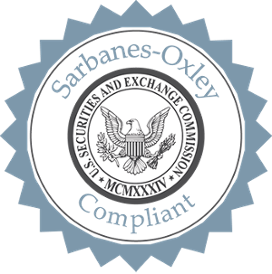Alleviating Sarbanes-Oxley Act Risks with Records Management
Wed, Feb 06, 2019
By: Steve Clopton

Every company has a responsibility to keep accurate accounts. The Sarbanes-Oxley Act of 2002 dictates specific record-keeping and accounting requirements. Failure to comply with them can lead to legal penalties as well as damage to your reputation.
The solution is compliant records management with a company that fully understands the regulatory requirements and can help you manage, store, and destroy records accordingly. At Gilmore Services, we provide SOX-compliant services to our corporate clients. Here’s what you can do to ensure that your records are properly stored and managed.
Why Sarbanes-Oxley Compliance Matters
The Sarbanes-Oxley Act was created by legislators in the aftermath of the Enron debacle, which involved malfeasance on the part of the company and its accounting firm. The firm’s financial records were misleading to shareholders and the accountants destroyed information related to an SEC investigation. Sarbanes-Oxley requires companies to maintain clear and accurate records, and to adhere to strict document storage and destruction timelines.
The law applies to all public companies. However, it is also relevant for privately-held companies, particularly those that are:
- Considering an initial public offering (IPO);
- Weighing offers from public companies; or
- Dealing with venture capital investment.
Even if your company has no immediate plans for an IPO or sale, it’s still a good idea to comply with Sarbanes-Oxley requirements. The key is to partner with a reputable document management company.
Tips for Proper SOX-Compliant Records Management
If you haven’t considered the issue of compliant records management before now, don’t worry. It’s never too late to start. Here are some tips to help you manage your records going forward.
1. Hire a Certified Records Management Partner
Your first step should be to hire a certified records management partner like Gilmore Services. It’s important to hire the right company. The service you choose should be NAID certified and have a stellar reputation when it comes to records management.
At Gilmore Services, we have a proven Release of Information (ROI) process and years of experience with Record Retention Scheduling. Our clients know they can rely on us to keep them in compliance.
2. Create a Document Retention and Destruction Schedule
Next, you’ll need to catalog your existing records and create a document retention and destruction schedule in accordance with Sarbanes-Oxley requirements. Our experienced document retention experts can help you with this step.
Doing a complete audit of the records you have on hand is a must. In some cases, a company may need to comply with several regulatory requirements. In addition to Sarbanes-Oxley, some companies must comply with HIPAA and FACTA regulations, as well.
3. Store Your Records Properly
Sometimes, companies think that it’s more cost-effective to store their records on-site. While on the surface it might seem less expensive to do so, there are some genuine risks involved, too.
The solution we recommend is to choose a record management partner that also provides document storage. For example, Gilmore Services can:
- Catalog your documents for quick retrieval
- Protect your documents from flood, fire, and other damage
- Limit access to your documents by providing top-notch security
Proper storage of your documents is an essential part of Sarbanes-Oxley compliance. Storing your records with an experienced, secure partner will ensure that you know what you have. It will also make it easy to retrieve records when you need them while providing you with protection from environmental threats and security breaches.
Conclusion
The best way to alleviate the risks associated with Sarbanes-Oxley non-compliance is to seek out a reliable and experienced compliant records management partner like Gilmore Services.
To learn more about our Sarbanex-Oxley compliant record management services, please click here now
